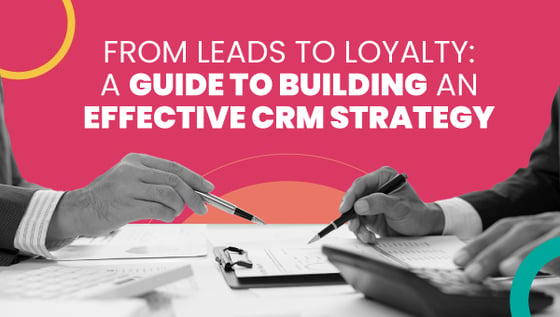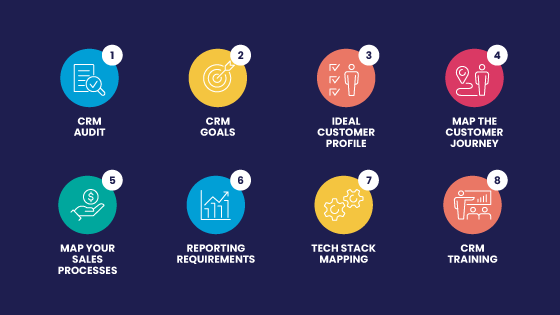


From Leads to Loyalty: A Guide to Building an Effective CRM Strategy




Developing and nurturing strong customer relationships starts with an effective CRM. Whether you're experiencing rapid growth that exposes the limitations of your current CRM, transitioning from spreadsheets to a CRM, or migrating between CRMs, a well-defined CRM strategy is crucial.
Why is it so important?
Failure to build your CRM strategy with scalability and growth in mind can result in fragmented data, manual processes prone to errors, and inconsistent customer interactions.
By transitioning from spreadsheets to a CRM, a CRM strategy ensures that you establish scalable processes and provide the necessary infrastructure for your customer data, setting you up for long-term success.
Furthermore, a well-defined CRM strategy is invaluable when migrating between CRMs. It allows you to avoid transferring unnecessary data, processes, and customisations from the old CRM to the new one, among other significant benefits.
This guide will explore the key steps to building an effective CRM strategy that will help you nurture customer relationships and drive long-term business growth.

How To Create a CRM Strategy
Complete an Audit
Before enhancing your CRM strategy, assessing your current CRM approach and identifying areas that need improvement is essential. You should walk away with a better understanding of your existing data landscape and the additional information necessary to enrich your strategy.
Consider data points that help you understand:
- What is the blueprint for collecting, organising and interlinking data within your CRM?
- Can cross-functional teams access the data they need to nurture and build relationships?
- Is it possible to segment customers?
- Is it easy for teams to find the information required?
Additionally, assess the tools you are currently using for CRM.
- Are they providing the functionality and features you need?
- Are there any limitations that are hindering your CRM efforts?
Another crucial aspect of the audit is assessing data quality.
- How accurate and up-to-date is your customer data?
- Are there duplicate or incomplete records?
Set Goals for Your CRM Implementation or Optimisation Project
Once you better understand your current data landscape, it's time to look to the future and set goals for your CRM implementation or optimisation project.
Like a ship needs a destination, a CRM strategy needs clear goals to guide its course. Define what you want to achieve with your CRM efforts.
When creating them, consider long - and short-term objectives that will help you track progress after each milestone.
Examples of these include:
- Reduce customer onboarding time by 20%.
- Increase customer retention rate by 10%.
- Automate 30% of lead nurturing activities.
Setting goals also helps you prioritise your CRM initiatives. With limited resources and competing priorities, it's essential to focus on the activities that will impact your business most. By defining clear goals, you can align your CRM strategy with your overall business objectives and allocate resources accordingly.
Goals guide your CRM strategy and act as a benchmark for measuring success. Setting specific, measurable, achievable, relevant, and time-bound (SMART) goals allows you to track your progress and see if your CRM efforts are getting the desired results.
Ultimately, setting goals for your CRM strategy is about creating a roadmap for success. It brings clarity, focus, and accountability, ensuring your efforts align with your business objectives and deliver tangible outcomes.
Identify Your Ideal Customer Profile (ICP) and Segment Customers
The ideal customer profile (ICP) is a key element when crafting your CRM strategy, as this will help you better understand the needs and concerns of your most valuable customers. To define your ICP, consider the characteristics and behaviours of your current best customers and prospects that are most likely to convert.
Defining your ICP is a pivotal step when implementing or optimising a CRM. The ICP delineates the traits of your perfect customer: their industry, size, location, and behavioural characteristics. Understanding these lets you personalise your marketing and sales efforts to attract and retain these high-value customers.
Moreover, knowing your ICP can enhance lead scoring, enabling your sales team to prioritise prospects that resemble your ICP. This results in increased efficiency and effectiveness of your CRM, ultimately leading to improved conversion rates and customer satisfaction. Therefore, a well-defined ICP is fundamental to driving value from your CRM strategy.
Map your Customer Journey
Customer journey maps visually represent the various touch points and interactions a customer has with your business throughout their buying journey. You can gain valuable insights into customer behaviour, preferences, and pain points by mapping out these journeys.
First, start out by mapping your customer's current journey. From their initial visit to your website, what interactions do they have before and after becoming customers?
The answers to these questions will identify opportunities for improvement. You can use this insight to implement changes that improve customer experience, boost engagement, and increase loyalty.
Then, when outlining your improved customer journey, think about how you will:
- Grab your audience's attention
- Pique their curiosity and get them to convert
- Guide their journey with relevant information that caters to their needs and goals
- Offer a seamless journey across all customer0facing team
Map Your Sales Process
Effective CRM strategies align sales processes with customer needs and preferences. Take the time to map out your sales process, from lead generation to closing the deal. Identify the key stages of your sales cycle and define the actions and touch points associated with each stage.
Think of your sales process as a well-choreographed dance. Each step is carefully planned and executed, ensuring a smooth flow from one stage to the next. By mapping your sales process, you can streamline operations, identify areas for improvement, and increase efficiency in converting leads into loyal customers.
Consider Reporting Requirements
Data is the fuel that powers CRM strategies. Consider what metrics and data points are important for your business. Do you need to track customer acquisition costs, customer lifetime value, or customer satisfaction scores? Identifying the key performance indicators (KPIs) allows you to evaluate the effectiveness of your CRM strategy and make data-driven decisions.
Tech Stack Mapping
When planning your tech stack, it is crucial to consider your customers' and your team's requirements and objectives. You should also consider the seamless integration of various components within your broader tech stack. This holistic approach ensures the effective alignment of your technological solutions with all stakeholders' needs.
When building your tech stack, here are some features to consider:
- Contact Management
- Lead Tracking
- Automation
- Sales Deal Management
- Mobile Accessibility
- Revenue Intelligence
The Value of HubSpot's All-in-One Platform
The holistic approach of HubSpot's all-in-one platform offers tremendous value by integrating tools across data management, marketing, sales, and service. This comprehensive solution allows businesses to streamline operations and boost efficiency, eliminating the need for multiple disparate tools.
Team Training
Team training is of utmost importance when considering your broader CRM strategy. An effective CRM strategy relies on a team that is well-trained and empowered. Dedicate the time to equip your employees with the knowledge and skills to effectively implement and execute your CRM strategy. Cultivate a culture of continuous learning and provide ongoing support to ensure the adoption and mastery of CRM tools and processes.
Build Your CRM Strategy with Six & Flow
Building an effective CRM strategy is a complex task that requires a deep understanding of customer needs and an optimised approach. At Six & Flow, we specialise in helping businesses build and implement CRM strategies that drive results. Our team of experts can guide you through each step of the process, from audit to optimisation, and ensure that your CRM strategy aligns with your business objectives.
Think of Six & Flow as your CRM strategy partner. We are here to guide you through the twists and turns of customer relationship management, helping you transform leads into loyal customers and unleash the full potential of your business.
By following these steps and leveraging the power of CRM, you can transform your customer relationships and drive long-term business success. Building an effective CRM strategy is a journey, not a destination. Continually refine and adapt your approach based on customer feedback and market trends to stay ahead of the competition and foster customer loyalty.








